Synod begins with Eucharist
The Diocese of Toronto’s 157th Regular Session of Synod began on Nov. 24 at 11 a.m. with a Eucharist, followed by lunch and the business session. The theme of Synod is “Growing in Christ,” which is also the name of the Diocese’s new strategic plan for the next four years. The name is taken from Ephesians 4:15: “But speaking the truth in love, we must grow up in every way into him who is the head, into Christ.” Synod is being held at the Sheraton Parkway Toronto North Hotel & Suites in Richmond Hill. There were 633 voting and non-voting members in attendance.
New canons and archdeacon named
Archbishop Colin Johnson announced new canons and an archdeacon. They are:
- The Rev. Canon Byron Gilmore, Christ Church, Brampton
- The Rev. Canon Christopher (Kit) Greaves, Christ Memorial, Oshawa
- The Rev. Canon Gary van der Meer, St. Anne, Gladstone Ave., Toronto
- Deacon Canon Jacqueline Boutheon, Christ Church, Scarborough
- The Rev. Canon Joan Cavanagh-Clark, Parish of Kinmount, Minden and Maple Lake
- The Rev. Canon Joanne Davies, chaplain at Sunnybrook Health Sciences Centre and St. John Rehabilitation Hospital, Toronto
- The Rev. Canon Philip Der, St. Christopher, Richmond Hill
- Canon Mary Conliffe, Diocesan Executive Assistant to the Archbishop
- The Ven. Kyn Barker, coordinator of Deacons, Archdeacon of Toronto
A first for Synod
For the first time, Synod has a social media wall – a large screen that shows a loop of posts about Synod from Twitter and Instagram. To see their posts on the wall, Synod members used the hashtag #synodTO with their messages and photos.
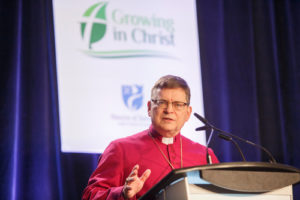
Archbishop delivers Charge
In his Charge to Synod, Archbishop Johnson spoke about Bishop John Strachan’s contributions to the Diocese, the Diocese’s new strategic plan, his thoughts about the Diocese since General Synod 2016, his coming retirement and his request for the election of a coadjutor bishop. Watch the video or read the full text.
Members practice electronic voting
As in previous Synods, members used electronic devices, called response pads, to vote. They were given instructions and took part in a few test polls to practise. In a light-hearted moment, Synod was asked to vote on a mock motion that Synod be adjourned. Seventy per cent voted in favour and 30 per cent were opposed.
New Executive Director introduced
Archbishop Johnson introduced Angela Hantoumakos, the Diocese’s new Executive Director. She will begin on Dec. 4. See related story.
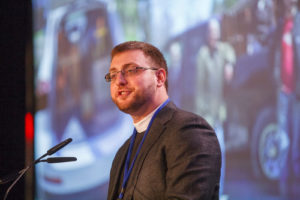
Missional and Outreach Moment #1: A Christian Community in the Making
The Rev. Jeff Potter told the story of St. Stephen, Maple, a new church plant that is nearly a year old. The original St. Stephen’s closed in 2008 and the building was deconsecrated. However, the land was kept and eventually a reboot was imagined. The church was in need of repair “but we could feel the potential,” he said. In time, a small group came together and on Oct. 30 of last year Bishop Peter Fenty reconsecrated the church. The first public service followed on the first Sunday in Advent and was a great occasion. Since then, the church has grown and word continues to spread, reflecting the church’s motto, “a Christian community in the making.” Mr. Potter thanked the many people who were involved in this reboot, especially the Rev. Canon Susan Bell, the Diocese’s Canon Missioner.
Constitution and Canon changes approved
Synod approved changes to the Constitution that would give the Secretary of Synod the authority to deal with late registrations at Synod. Synod also approved revisions to Canon 10 – Clerical Appointments, Exchanges, Retirements and Terminations, to allow the combination of a churchwarden and deputy churchwarden to be members of a parish selection committee. Finally, Synod approved revisions to Canon 15 – Churchwardens, to allow for flexibility when the collecting and counting of the offerings of a congregation are conducted. There will be a two-step process whereby the churchwardens confirm the custody of envelopes, loose cash and cheques and then ensure that the formal count is conducted within a specified time frame. Churchwardens will be required to forward a copy of the annual budget with the statistical and financial returns to the Secretary of Synod. See Section G – Canon and Constitution Changes
Synod approves election for coadjutor bishop
Synod approved a motion to have an election of a coadjutor bishop in 2018. In September, Archbishop Johnson announced that he was retiring and informed Diocesan Council that he would be asking Synod to concur with his request for the election of a coadjutor bishop for the Diocese of Toronto. The electoral Synod will likely happen in June of 2018. See Section A – Convening Circular
Synod debates motion to revise election requirements
Synod discussed a motion that proposed amendments to sections 10 and 11 of the Constitution, which deal with the way bishops are elected. The amendments would require a diocesan bishop or coadjutor bishop to be elected by two-thirds of the total votes cast in both the Order of Clergy and the Order of Laity. (Currently, only a majority of the total votes cast in each order are needed for the election of a bishop.) Furthermore, the name of the candidate with the lowest number of votes in the combined orders would be eliminated in each round of voting, except when there are fewer than four candidates remaining or the candidate with the lowest total number of votes in the combined orders received 10 or more votes in each order.
The proposed changes applied only to the election of a diocesan bishop or a coadjutor bishop; the election of a suffragan bishop would continue to require a simple majority in each order.
A background note to the motion gave the rationale for the proposed changes. It stated that some other dioceses have a two-thirds threshold among clergy and laity for the election of a diocesan bishop. This ensures that the cleric elected has broad support across the Diocese and is able to represent that diversity within the Anglican Church of Canada and the wider Communion.
The motion can be found in Section A – Convening Circular. Diocesan Council had forwarded the motion to Synod with the recommendation that it be adopted.
After debate, Synod voted on the motion. Because it was a proposed change to the Constitution, it required 75 per cent approval to come into effect immediately. It received 68 per cent approval. Therefore, it will be required to come to the next regular session of Synod for it to be passed.
Group seeks Synod’s help in creating process for marriage canon discussions
After wide consultation, Archbishop Colin Johnson has convened a group to create a process for the Diocese to discuss the proposed changes to General Synod’s Marriage Canon, which would allow for same-sex marriage in the Anglican Church of Canada. General Synod voted on the proposed changes last year and will do so again in 2019. In the meantime, it has referred the matter to diocesan and provincial Synods for their consideration.
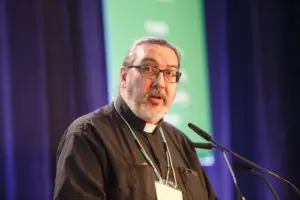
The group consists of Marge Watters Knebel, ODT (chair), Chris Ambidge, the Rev. Canon Susan Bell, Pamela Boisvert, the Rev. Chris Harper, the Rev. Canon Philip Hobson, the Rev. Ian LaFleur, Ryan Ramsden, the Rev. Mark Regis, and it is facilitated by Janet Marshall. Its mandate is to formulate a process for the Diocese that will start at this Synod and continue at the Diocese’s next regular session of Synod in November 2018.
Archbishop Johnson called on Ms. Watters Knebel, the Rev. Canon Alyson Barnett-Cowan, Mr. Harper and Mr. Regis to speak to Synod. A hard copy of their presentations was also made available to Synod members.
Ms. Watters Knebel said that both Archbishop Fred Hiltz, the Primate, and Archbishop Johnson have written pastoral responses that set the tone for the process. In a statement dated July 14, 2016, the Primate wrote: “More than ever we must make efforts not to turn away from one another, but rather to one another, not to ignore but to recognize one another, not to walk apart but together.” In a Pastoral Statement dated Sept. 27 of this year, which is available on the diocesan website, Archbishop Johnson wrote: “All of us need to extend to each other the most generous Christian charity that Jesus our Redeemer calls us to exercise as we, together, seek to discern and live out God’s will.”
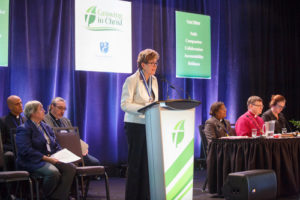
Ms. Watters Knebel stressed the importance of the process not just to the Diocese but the wider Church. “What we do here in the Toronto Diocese is quite important,” she said. “It will be noticed. As the largest and most multicultural Canadian Diocese, we have a distinct voice within the Canadian church. We have an opportunity to be a beacon of hope for the wider Church, by responding in a way that models unity in diversity, celebrates the strengths and gifts of diversity and reflects our common commitment to the Gospel of Jesus Christ and the mission of the Church. Our process may be of help to others and it will certainly be of interest as the national church prepares for General Synod 2019.
“The mandate before us is open-ended. Each diocese has been given the opportunity to consider the proposed change to the Marriage Canon in a way that makes sense for them. We have been given no specific directions or deliverables, and there is to be no vote. Our discussions and conversations need not be brought to any conclusion or decision. How we consider this is up to us.
“This afternoon we ask for the help of this body in creating a process that will serve you, your parishes and the Diocese. We want our plans to reflect your ideas and wishes.”
To further set the context for the table discussions that followed, Mr. Harper, Canon Barnett-Cowan and Mr. Regis were invited to speak. Mr. Harper, the Diocese’s Indigenous Native Priest, called the Diocese “the poster child of diversity” with its many people and churches. “It is our diversity that we should celebrate with one voice, for in our diversity God reveals His glory and depth of love, for the love of the world He gave His Son,” he said. “In our diversity we are all called and named as children of creation and God knows us, and we are called to be His peace to the world. And as hope was given to us in faith, we are to witness hope to all that we encounter in all what we think, say and do.
“So I call you for a short time: express love, peace and hope as only you can, as a child of God’s calling. Set aside the divisive chains of politics and our own personal sensitivities, so that we might walk together and respectfully see each other for who we have been called to be… a child of God in the family of God, created in diversity.”
Canon Barnett-Cowan, who has held senior positions in the Canadian Church and the Anglican Communion, recounted some of the key moments in the Church’s discussions on homosexuality, same-sex blessings and same-sex marriage over the past 40 years. She said that at every point there has been an attempt to understand all points of view and to honour differences.
“When (the Church) is at its best has been when it has truly focused on listening: listening to the Scriptures, listening to the experience of gay and lesbian people, listening to those who come from different cultural and theological contexts, listening to those who truly do not know what is right, listening to those who are convinced that they are right,” she said.
She spoke about some of the times when the Canadian Church seemed to coalesce and find a common mind, describing the work of General Synods in 1995, 2004 and 2010.
“I could easily list the times when the opposite has happened, when process got in the way of discernment instead of serving it, and when people felt that they had been rudely overruled by a majority,” she said. “Moreover, many in the Church have expressed anguish about the length of time that this process has taken, and the personal cost to them.
“But I would rather you lift up your heads to consider that the path of dialogue, far from keeping the Church from doing anything at all, is in fact the only path it can follow if it is to maintain its unity and seek the truth in all honesty.”
Ms. Regis, an associate priest at St. Paul, Bloor Street, spoke about how Archbishop Johnson, following the contentious vote at General Synod in 2016, called a series of meetings with clergy who hold to the historic definition of marriage, to hear their concerns. Close to 70 clergy in the Diocese voiced their concerns officially, along with many lay people, he said, culminating in facilitated discussions over two days with Archbishop Johnson and a group of representative clergy in August. These discussions were facilitated by Canon Barnett-Cowan and Archbishop Josiah Idowu-Fearon, the current Secretary General of the Communion. “During those discussions, a refreshed commitment to the validity of the historic understanding of marriage and those so convicted was affirmed, and a shared desire to move forward together as a Diocese was upheld,” he said. “This aim is reflected in the Archbishop’s recent pastoral statement which can be found on the diocesan website.”
Mr. Regis ended by saying: “The Canadian Church is in a process of discernment, and as this discernment continues, we in the Diocese of Toronto have a unique opportunity and possibly even a charism to engage and model a gracious way where divergent understandings of marriage and other significant matters of faith can faithfully bear with one another. Ongoing dialogue is essential in living this out… Let us continue in prayer as we listen for God’s voice in mission, asking for renewal within a time of great cultural and ecclesiastical change.”
After their presentations, Ms. Watters Knebel asked Synod members to discuss at their tables this question:
“There will be a Regular Session of Synod in 2018 where proposed changes to General Synod’s Marriage Canon will be discussed. What would be most helpful to you and the Diocese in preparing for that conversation?” (It was noted that in 2018 there will be a diocesan discussion, not a vote.)
After 15 minutes of discussions, Synod members were asked to individually record their ideas and suggestions on a piece of paper. The committee will use those suggestions as it designs a process for the conversation. The committee members will compile the suggestions and will report back on the second day of Synod.
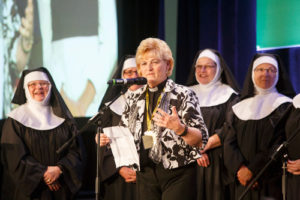
Dinner
Synod enjoyed a hot meal and was entertained by Sister Act, a group of singers from the Parish of Kinmount, Minden and Maple Lake.
Synod’s sponsors thanked
Gratitude was expressed to Synod’s sponsors, who helped offset the costs of the event. They include:
- CGOV Asset Management and Letko Brosseau (dinner co-sponsors)
- Canso Investment Counsel Limited and Northleaf Capital Partners (refreshment sponsors)
- The Dalton Company (WiFi sponsor)
- AON (reception supporter)
- Ecclesiastical Insurance and Marsh Limited (refreshment supporters)
- Trinity College and Wycliffe College (worship sponsors)
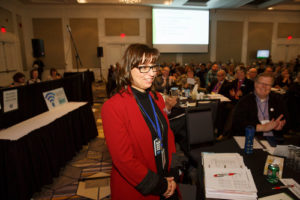
New strategic plan, Growing in Christ, lays out bold vision
After dinner, Synod members listened to a presentation about the Diocese’s new strategic plan, Growing in Christ. The plan lays out a bold five-year vision (2016-2021) and sets the foundations for how we will work together to build healthy, missional Anglican communities that engage faithfully with the world and share the gospel of Jesus Christ. Here are the main parts of the plan:
Our vision: “An Anglican community committed to proclaiming and embodying Jesus Christ through compassionate service, intelligent faith and Godly worship.”
Our mission: “We build healthy, missional Anglican communities that engage faithfully with the world and share the gospel of Jesus Christ.”
Our values: “Faith, compassion, collaboration, accountability, boldness.”
The plan has identified five Focus Areas to guide and determine the priorities for the Diocese’s resources over the coming years: leadership and formation, trust and culture, innovation based on evidence, governance and decision-making, and stewardship of resources
Susan Abell, ODT, the Diocese’s interim Chief Administrative Officer, led the presentation. She introduced a video of an interview with Jack Welch, the former CEO of General Electric, speaking on leadership, vision, mission, and energizing people.
After the video, Ms. Abell encouraged Synod members to read the Growing in Christ document in full. “We need to remind ourselves that the vision is something that will not change through time,” she said. “Our mission is what we are called to do today to realize the vision.”
She said a strategic plan helps Anglicans have a way of thinking and talking together. She said the conversations have been very rich. “It gives permission and support to lift things up and think together,” she said.
Synod heard from representatives of the working groups talk about their progress. At the end of the presentation, Ms. Abell asked Synod members to sit quietly for a moment and then write down on a notepad what impressed or interested them today about the plan, and what they would like to take back to their parishes to pursue further. They were encouraged to drop their ideas into a basket on the way out of the plenary hall, and to also take one of their comments back home with them as a reminder.
Learn more about Growing in Christ.
Synod ends day with prayer
Synod ended for the day with closing prayers led by the Rev. David Bryan Hoopes, OHC, the Synod chaplain.
Social media highlights
See the activity on social media from day 1.